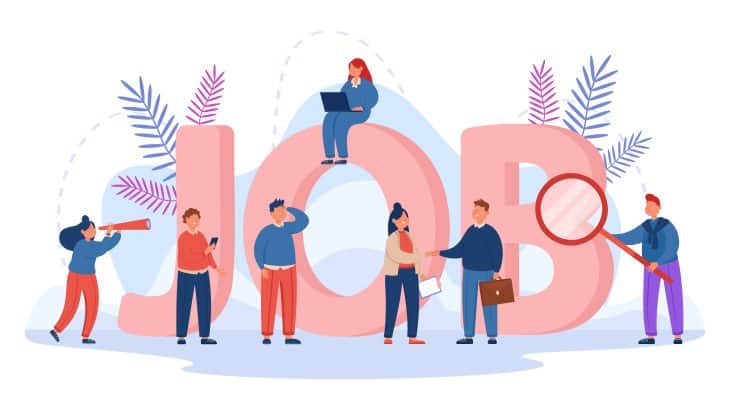The Human Resource Department, also known as the HR department, is one of the most crucial parts of an organisation. Most people think professionals in this department only handle recruitment issues. However, an HR professional has many additional tasks along with recruitment. You might also not be aware that there are different types of human resources job profiles.
This article will discuss the types of HR job roles and responsibilities. It is also interesting to know that depending on the types of HRM professionals, the organisation endows them with different roles and responsibilities. Some of the profiles are for senior positions and have a higher pay scale.
What do we understand by Human Resources?
Before we learn and understand different types of HR job roles and responsibilities, we must understand the broad spectrum of Human Resources.
As mentioned previously, the Human Resources department of a company oversees the development and management of the employees working in the company. There are various aspects involved in this, including the hiring process of employees like interviewing, recruiting, and training.
The HR department is also closely involved in addressing problem areas in the organisation like fair labour practices, conflict resolution, and workplace diversity. In case there is a conflict between the employer and employees or between two employees, the HR department must intervene in the matter and resolve it amicably.
The importance of an HR department in an organisation
Organisations with a strong HR department function better since they perfectly organise everything and ensure optimal conflict resolution. Usually, employees have high productivity and a longer retention rate as well. This is beneficial for the company as it helps in saving lots of time and money.
The HR department must perform extensive research to ensure that the company pays competitive wages to employees per market standards. Of course, it also takes care of employee benefits.
Some common types of human resources specialities
Mentioned below are some HR specialities:
1. Human Resources Assistant
The primary duty of a Human Resources Assistant is to assist HR managers and directors with various administrative tasks. An HR assistant’s responsibilities include documenting terminations, absences, grievances, performance reports, and compensation information of multiple employees. These assistants often write job descriptions, communicate with applicants, and contact references provided by applicants.
2. Employment Specialist
Employment specialists or job placement specialists find suitable candidates for specific job profiles. Generally, they are a part of a company’s HR department or work independently for any employment agency. As employment specialists, they must have deep knowledge of a company’s hiring processes, job descriptions, benefits packages, and salary structure.
3. Human Resources Generalist
Among the types of HR roles, the Human Resources generalist needs special mention. They are highly proficient in carrying out various kinds of administrative jobs so that the human resource department keeps on working smoothly. They manage regular operations of the HR department concerning procedures, policies, and programs. A human resource generalist is responsible for overseeing organisational development, reporting and regulatory compliance, employee safety & welfare, and employee-company communication.
4. Human Resources Manager
A Human Resources manager ensures that all HR members perform well. HR managers often have meetings with executive-level employees to devise strategies for the hiring process. They also guide team members to help them fetch the desired results. Generally, HR managers handle sensitive and confidential employee issues and conduct exit interviews. They maintain organisational charts and department records.
5. Human Resources Coordinator
An organisation must have proper coordination among all its departments. The Human Resources coordinator plays a vital role in facilitating HR functions and programs under the direction and guidance of the HR manager or director. Some of their essential tasks include addressing employee concerns, scheduling orientations, and coordinating employee training and development. HR coordinators research industry best practices and trends for improving HR policies and enhancing employee satisfaction.
6. Recruitment Manager
Recruitment managers hire specialists who manage the interview process, employee sourcing, onboarding and termination processes. They have good knowledge of labour legislation. Recruitment managers hold meetings with managers of other departments to get an idea of the firm’s hiring needs. They also track recruiting metrics to ensure efficient recruitment practices.
7. Labor Relations Specialist
This is one of the less found types of HR professionals. Labour relations specialists are confident and experts in labour laws, economics, wage data, and collective bargaining patterns with the union. They must prepare information that executive managers require during the collective bargaining process. Labour relations specialists play a pivotal role in implementing industrial labour relations programs, advising staff in the human resources department, managing various grievance procedures, and compiling statistical information to guide the company’s decisions on employee contracts.
8. Employee Relations Manager
An employee relations manager maintains peace and harmony in the workplace. They are well-versed in state and federal employment laws. Hence, they know how to handle conflicts in the workplace efficiently. Since they negotiate with people daily, they must possess excellent communication and interpersonal skills.
9. Director of Human Resources
The Director of Human Resources is probably the highest designation offered in the HR department. Also known as HR directors, they have a long history of working in the human resources department, particularly with managing teams. Their primary function is to supervise the whole human resources department for maximum productivity and profitability. The HR director reports to the company’s CEO. They oversee employee orientation and training programs, ensuring compliance with state, federal & local laws.
10. Director of Employee Experience
A Director of Employee Experience is highly skilled in business strategy. The professional has excellent problem-solving skills. They collaborate with other executives to offer actionable recommendations for career planning. Other works include team-building exercises and other programs for enhancing employee satisfaction. They are actively involved in shaping positive company culture.







